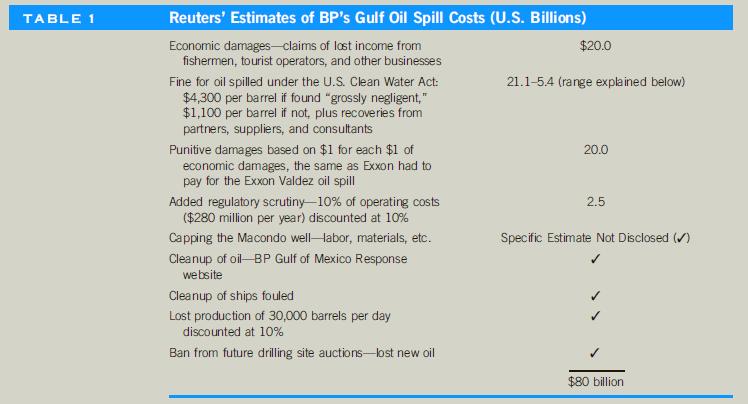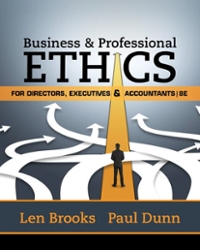One of the worlds largest oil spills began on April 20, 2010, in BPs Deepwater Horizon/ Macondo
Question:
One of the world’s largest oil spills began on April 20, 2010, in BP’s Deepwater Horizon/
Macondo well in the Gulf of Mexico.
Although the world did not take significant notice until the next day, an estimated 62,000 barrels of oil and gas escaped into the Gulf for most of the next 95 days until the well was capped on July 27. Damage to the Gulf Coast fishery, tourism, and quality of life was catastrophic.
At first, BP estimated that the cost of cleanup alone would be \($3\) billion to \($6\) billion1 and set aside a claims fund of \($20\) billion.2 On July 27, BP set aside \($32.2\) billion3 to settle claims for loss of income and cleanup and other costs. Later BP decided to raise their estimate to \($40\) billion, but even that may prove not to be enough.
On December 1, 2010, Reuters published a “Special Report” that suggested BP’s costs could rise to twice BP’s final estimate—all the way to \($80\) billion.4 Their estimates are noted in Table 1.
Estimates by Reuters included several uncertainties. For some, Reuters included a range of outcomes; for others, they simply stated their existence.

Some uncertainties will take time to clarify, such as (1) how many of the claimants of lost revenue or income can prove the basis of their claim since they may not have paid taxes on all the revenue they earned or (2) the future price of a barrel of oil. However, reasonable estimates or assumptions can be made that can contribute to a useful overall estimate.
Some matters require ultimate clarification by court judgment or political decision because current opinions conflict. For example, if BP, the project operator, is judged as “grossly negligent,” then BP would be liable for a fine of \($4,300\) per barrel spilled rather than \($1,100\) per barrel, and BP’s partners—Anadarko Petroleum (25%) and Japan’s Mitsui (10%)—would not have to pay any fines and cleanup costs. In addition, companies such as those hired to drill (Transocean) and provide consulting advice (Halliburton) could also be off the hook. It would appear, however, that the White House Oil Spill Commission5 did not find direct evidence that BP’s senior management had been reckless and therefore grossly negligent. They found no direct evidence of a “conscious decision to favor dollars over safety,” which suggested instead that the tragedy could be characterized as “a mistake by a low-level worker.” On the other hand, the commission’s cochairmen indicated that BP had “a culture that did not promote safety” and that their report “did not mean anyone was off the hook.” Rumors were also reported of a potential political deal to lower the fine from \($4,300\) per barrel.........
Questions:-
1. What are the costs to other stakeholders in society beyond those that Reuters included? How would these costs be estimated?
2. Has the cost of lost reputation been included by Reuters? If not, how could it be estimated?
3. Since there are so many uncertainties involved in analyses such as Reuters presented, are analyses like this useful?
Why or why not?
4. Calculate the discounted value of BP’s estimated lost production for an appropriate time horizon using reasonable assumptions for discount rate and price of a barrel of oil. Justify your assumptions.
5. Why were BP’s early estimates so low?
After all, as Reuters reports, BP had experience with two other recent cases.
Step by Step Answer:

Business And Professional Ethics
ISBN: 9781337514460
8th Edition
Authors: Leonard J Brooks, Paul Dunn





